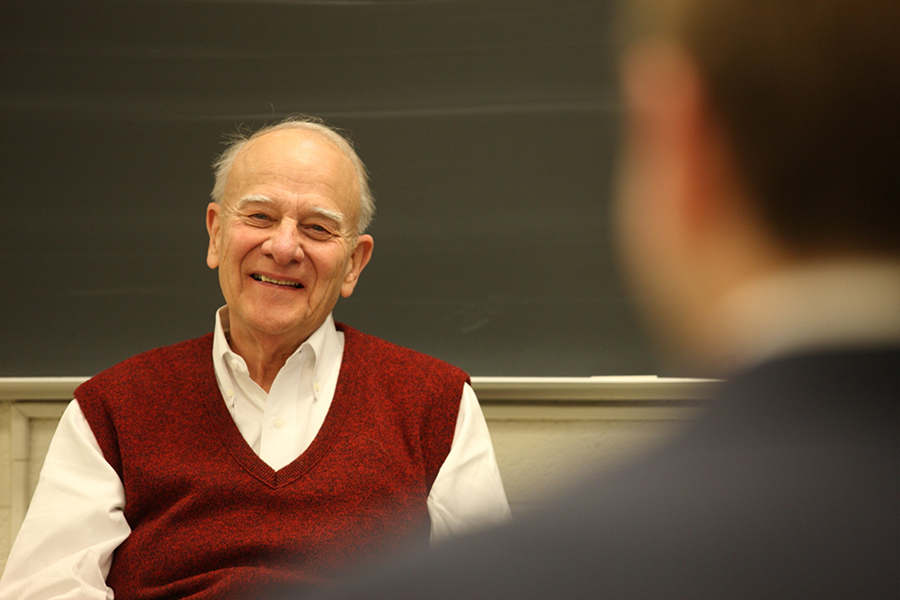Obituary: Computing Pioneer William Wulf Leaves Lasting Mark on Teaching, Research
Susie CribbsFriday, March 17, 2023Print this page.

William Allan (Bill) Wulf earned one of the first doctorates in computer science; developed crucial advances in programming languages and compilers; and helped shape the future of computer science education, research and national policy. A pioneer in nearly all aspects of the field, the former Carnegie Mellon University faculty member and honorary degree recipient died on Friday, March 10, 2023. He was 83.
Wulf joined the CMU faculty as an assistant professor of computer science in 1968 after earning the first Ph.D. from the University of Virginia’s newly founded Department of Applied Mathematics and Computer Science. He rose to full professor in 1975. While at CMU, Wulf helped develop C.mmp, a multiprocessor system for which he and his students designed the software, known as Hydra. Hydra was written in BLISS, or Bill’s Language for Implementing System Software, a programming language later adopted by Digital Equipment Company. He also helped develop one of the first programming languages that incorporated abstract data types and formal verification, known as Alphard (the brightest star in the Hydra constellation). His work gave CMU the strong foundation in software engineering that continues to this day.
"Bill was a creative and thoughtful leader. He was one of the early systems faculty in computer science at CMU and helped set us on the path to prominence in software engineering," said Mary Shaw, one of Wulf's Ph.D. advisees and the Alan J. Perlis University Professor of Computer Science at CMU. "He brought a true engineering sensibility to operating system and programming language design."
While on campus, Wulf met his partner in both life and work, Anita Jones, who earned her Ph.D. in computer science and served on the faculty until she and Wulf left the university to found Tartan Laboratories. The software company, based on Wulf's research, specialized in compilers for programming languages, particularly Ada, and was one of the first companies that would transform Pittsburgh from steel town to tech hub. Wulf was also a founder of the city's High Technology Council, known now as the Pittsburgh Technology Council.
Texas Instruments acquired Tartan Laboratories in 1988, and Wulf returned to UVA, where he would go on to have an illustrious career as both a researcher and educator. He also served as assistant director of the National Science Foundation Computer and Information Science and Engineering directorate and director of the National Academy of Engineering.
"The Carnegie Mellon community mourns the loss of Bill Wulf, and we extend our deepest condolences to his wife, Anita, and their family," CMU President Farnam Jahanian said. "Bill's brilliant scholarship, research and thought leadership have left a profound impact on our nation's science and innovation enterprise and on the institutions he served, including the National Science Foundation, the National Academy of Engineering and CMU. Our university was incredibly fortunate to have counted Bill as a Tartan, especially in our School of Computer Science, where his legacy of innovation and commitment to creating opportunities for others will continue to reverberate."
Wulf earned countless honors throughout his career and held membership in nearly every major professional society in his field. He also helped establish the Virginia Academy of Science, Engineering and Medicine, and was a founding trustee of Egypt’s New Library of Alexandria. He received five honorary degrees, including the one from CMU in 1999; authored more than 100 papers and three books; held two U.S. patents; and supervised more than 25 Ph.D. students in computer science.
"The loss is personal as well as professional to me. Bill was my thesis advisor, along with Alan Perlis," Shaw said. "His research style and values had a large impact on mine, in particular starting me on the path of questioning conventional wisdom — a strategy that has served me well. He was a mentor, a collaborator and a friend."
According to UVA, Wulf's talent and devotion to uniting people for a purpose — for better engineering, better policy and a better society — was his greatest contribution.
"Bill often said, 'It is better to build bridges than walls,' and he lived his life accordingly," said UVA Professor Emeritus Gabriel Robins.
Wulf is survived by Jones; daughters Ellen Wulf Epstein and Karin Wulf; sons-in-law Steven Epstein and Christopher Grasso; and grandsons Henry and Abraham Epstein and John and Ethan Lofgren. The family asks that tributes be directed to the National Academy of Engineering or to the University of Virginia School of Engineering to support activities near to Wulf's heart, including women in engineering, diversity in engineering or engineering education.
For more on Wulf's life and legacy, read his full obituary on the University of Virginia website.
Aaron Aupperlee | 412-268-9068 | aaupperlee@cmu.edu
